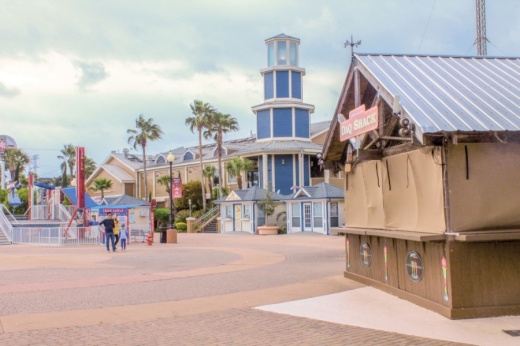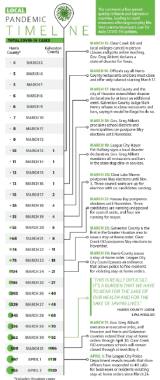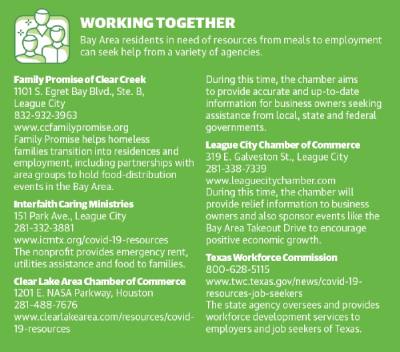Here are how several sectors of the Bay Area are responding to the outbreak.
BUSINESS WOES
Many Clear Lake and League City area businesses have felt the pain of mandated closures.
Since Gov. Greg Abbott’s order March 19, restaurants are not allowed to offer dine-in services and can only offer takeout, curbside pickup and delivery. On March 24, stay-at-home orders, which forced nonessential businesses to close, went into effect in both counties. The governor is limiting activity for all Texans to only essential needs through April.
Since the changes, Bay Area restaurants have adjusted accordingly to diversify their revenue streams. Over 100 eateries began serving customers with to-go orders or partnering with third-party companies such as GrubHub to deliver food to customers.
Still, they are feeling the effects.
Eva Sek, owner of Pierogi Queen in League City, said she and her family will be doing the deliveries themselves as vendors such as UberEats are charging more than the business can afford for their services. Their plans to expand the business to Houston are likely on hold, she said.
Other restaurants have closed temporarily, unable to bring in enough revenue to remain open, including Holly Berry Tea Room, Ocean Sushi Grill and Kirk and J’s BBQ.
Nonessential businesses have been mandated to close, meaning many small business owners are out of work. Courtney Sapp, owner of Escape Kemah, said the order has the potential to be devastating for her business.
“We are family-owned and -run; my husband, myself and our two college-age children create all of our rooms and puzzles,” she wrote. “I don’t know how we will survive. I have given up my teaching position to run our business, so there is no backup income on my end.”
University of Houston-Clear Lake’s Associate Professor of Management Troy Voelker said in a UHCL news release that small business owners can mitigate potentially devastating financial setbacks by staying up to date with any bailouts or assistance coming from federal, state or local government agencies; maintaining close contact with their supply chain; finding non-traditional ways to bring in revenue; and making sure employees do not feel forgotten or isolated with the social distancing recommendations.
This is also an opportune time for owners to address parts of the business that they might have been neglecting, Voelker said.
“Don’t focus on the negativity of the circumstances,” he said in the release. “Use this time to figure out how to connect with future customers and work on things you haven’t had time for.”
Cindy DeWease, president and CEO of Clear Lake Area Chamber of Commerce, said the chamber is doing what it can to gather information on what the government stimulus package will look like as it rolls out, but that the chamber is “in a time of almost limbo” as things continue to change each day. While small businesses are in a time of great need, the chamber is being careful not to disseminate misinformation, she said.
“How do we answer those needs when we don’t have the answers yet?” DeWease said. “Until we have a better grip on what’s available for them, we can’t speculate or predict what could happen, so we just want to give [business owners] the facts.”
The chamber’s COVID-19 resources page lists information about member restaurants and how they are modifying their services, as well as provides links to resources for job seekers. DeWease said the service and healthcare industries are still hiring and, based on a chamber survey of members that was conducted the week of March 23, those types of businesses are seeing revenue gains.
For instance, owners of home improvement and craft-related stores in Friendswood, Kemah and League City reported seeing an uptick in customers, many of whom have been using this time to stock up on creative supplies both via online portals and services such as curbside pickup.
Keyur “Kman” Amir opened a new Ace Hardware store March 2 in League City. Amir, who owns another Ace Hardware near Hobby Airport, said he saw an influx of customers buying barbecue supplies, gardening tools and home repair equipment. Customers stuck at home are working on landscaping and house projects, bringing in business, Amir said.
Small arts and crafts businesses in the Bay Area offered a variety of items to keep residents occupied during longer periods of time indoors.
“We’ve actually seen a large uptick as people have tried to prepare to be home,” said Cari Kerstiemf, owner of The Scrap Shack in Friendswood. “People need to be crafting.”
In the days leading up to the stay-at-home order, the shop started offering curbside pickup and online classes through Facebook Live, Kerstiemf said. There were many requests for ready-made kits, where customers have all the supplies for one particular project in one package, she said.
Lizzie Smith, who owns Southern Sass Vinyl & More in League City, said heat-transfer vinyl products—which are typically used for apparel and shirt making—sold well during the COVID-19 outbreak.
Beth Taylor, owner of Taylored Vinyls in Kemah, echoed Smith’s sentiment about the popularity of apparel-making.
“For whatever reasons, T-shirt making isn’t slowing down, and neither is the tumbler business,” Taylor said, adding that another popular purchase aside from T-shirt supplies has been the glitter used to decorate drink tumblers.
“I’m trying to be hopeful that we can at least provide somewhat of a distraction to what’s going on,” Kerstiemf said.
TOURISM DROP, ECONOMIC EFFECTS
Before the outbreak, officials at Space Center Houston, one of the largest tourist attractions in the Greater Houston area, said the museum was on pace to set a record-high attendance year. The center broke 1 million annual visitors for the first time in 2018 and saw 1.25 million visitors in 2019, and the center has a goal of seeing 2 million annual visitors, officials said.
However, in the early days of the outbreak, Space Center Houston CEO William Harris said the facility had just begun to see a drop in attendance numbers—about 20% in the last couple weeks of February. At the time, Harris and other officials thought the center would be a good alternative to out-of-state travel for locals trying to avoid the coronavirus and the center would largely be unaffected.
That quickly changed. Less than two weeks later, the center announced it would be closed through March 27, and that has been extended indefinitely.
Still, the center is doing what it can to serve the community despite being closed by providing educational content on social media, daily blog postings on its website and more.
“We’re in this together. We understand that everyone is facing challenges, including supporting their children with educational learning opportunities with limited resources,” CEO William Harris wrote to Community Impact Newspaper. “Throughout our closure, we will work hard and creatively to bring Space Center Houston to the public.”
Kemah Boardwalk, another popular Bay Area tourist spot, also closed around March 20. The drop in attendance to destinations is having a trickle-down effect.
Roy Green, general manager at South Shore Harbour Resort & Conference Center in League City, said in mid-March many upcoming events and stays had been canceled or postponed.
“Obviously, like every business in the area, we’re beginning to feel the impact more and more with each passing day,” he said.
The hotel—which serves corporate groups and tourists alike—closed March 21. Other hotels are feeling the effects as well, said Shawna Reid, Bay Area Houston Convention & Visitors Bureau marketing and visitors center manager.
“They’re all reporting minimal guest stays, which is to be expected in something like this,” she said. “There’s no tourists around right now.”
With devastating effects on tourism and business in general, the Bay Area is beginning to see a slow down, but it is too early to say what the long-term effects may be, said Dan Seal, executive director of economic development for the Bay Area Houston Economic Partnership.
Most of the area’s large companies are still working. Many businesses in the Bay Area, including medical, petrochemical, aerospace, are considered essential and allowed to remain open, Seal said.
“That should mitigate this disruption somewhat,” he said. “We probably have more than our fair share of these industries than other places around the country.”
However, many smaller companies are struggling, and it will take them time to bounce back, if they can at all, Seal said.
Seal said the Bay Area has a “can-do spirit” that will allow the area to recover quickly once the coronavirus outbreak subsides. In the end, the Bay Area will be stronger, he said.
“It’s already apparent that many of us are already adapting to this new norm,” Seal said. “We’re all just hoping we can get through this in short order.”






